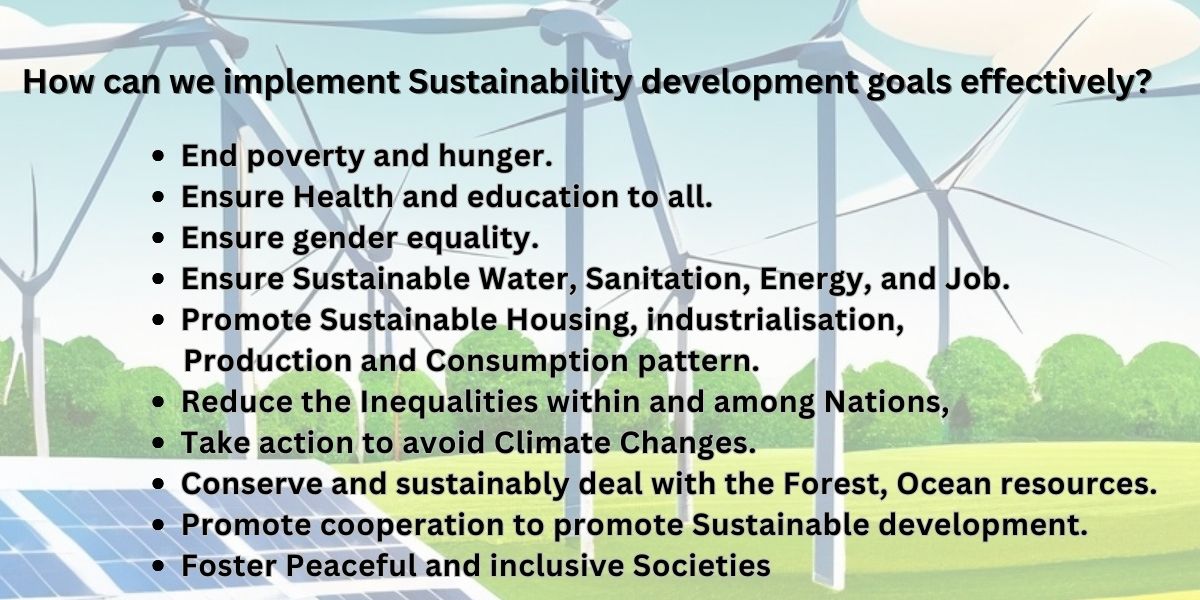According to United Nations, sustainability is “meeting the needs of the present without compromising the ability of future generations to meet their own needs”.
Sustainability is a continuous process. Three integral parts of sustainability are environmental, social and governance factors.
The survival of the inhabitants of the earth depends upon the natural resources and environment.
Social sustainability refers to the combined effort of humans to eradicate poverty and hunger. Providing facilities such as better education, healthcare, and transportation without any discrimination
Governance factors deal with how a business is managed and controlled, financial security, economic conditions, and corporate morality. For continuous economic production activities, the inputs are natural resources. It contains conventional and unconventional energy sources, metals, minerals, agricultural products, etc. In this article we will find answers to the question Why is the issue of sustainability important for development?
Environment development and sustainability
Due to mass environmental destruction by human activities, the world is witnessing very dangerous consequences such as global warming, ozone depletion, unpredictable climate changes, and desertification due to the drying up of water resources.
To create a sustainable future, destructive activities such as pollution, plastic waste, and toxic gas emissions must be prevented. To improve the lives of people around the globe and to reduce the gap between rich and poor, sustainable development programs are formulated.
Global warming is due to the burning of coal and fossil fuels. This can trigger the emission of gases such as greenhouse gases, including carbon dioxide. Global warming can cause the ice in the Arctic and Antarctic regions to melt and, in turn, produce a rise in sea level. This can also produce disasters such as storms and hurricanes. When a large amount of refrigerants, such as CFC’s, enter the stratosphere, chlorine is produced. Gases such as chlorine, bromine, etc. are the main reason for ozone depletion.
Large-scale destruction of trees and forests and demolishing hills causes soil erosion. Around the world, large-scale damage is caused by major floods and landslides. Planting trees with strong roots, which can hold the soil strongly, can stop soil erosion and landslides.
Conventional energy sources such as large hydroelectric power plants, thermal power plants, and diesel power plants have dangerous consequences for the environment. Unconventional energy sources, such as solar power and wind energy, improve sustainability.
In the agricultural field, chemical fertilizers and insecticides are useful for higher productivity, but they are doing more harm to the environment. Due to their large-scale application, the inhabitants are affected by so many dangerous diseases, and it also affects the fertility of agricultural fields negatively. Bio fertilizers and insecticides are very useful to curb this problem. The availability of bio fertilizer and insecticides must be ensured. Cow dung is now widely used as fertilizer, fuel, and as a raw material for paint manufacturing.
United Nations sustainable development program address 5P Model.
People – Planet –Partnership – Peace – prosperity.
People: End poverty and hunger in all forms and ensure dignity and equality
Planet: Protect our planet’s natural resources and climate for future generations
Partnership: Implement the agenda through a solid global partnership
Peace: Foster peaceful, just, and inclusive societies
Prosperity: Ensure prosperous and fulfilling lives in harmony with nature

The UN has formulated 17 Sustainability Development Goals, which can be summarised as follows:
End poverty and hunger.
Ensure Health and education to all.
Ensure gender equality.
Ensure Sustainable Water, Sanitation, Energy, and Job.
Promote Sustainable Housing, industrialisation, Production and Consumption pattern.
Reduce the Inequalities within and among Nations.
Take action to avoid Climate Changes.
Conserve and sustainably deal with the Forest, Ocean resources.
Promote cooperation to promote Sustainable development.
Foster Peaceful and inclusive Societies.
Sustainability Report
A Sustainability report is a document to inform its stake holders about the initiatives taken by the company regarding Sustainability issues, their commitment to Environmental, Social and Governance (ESG) principles, their achievement and the impact created by it.
Environmental: How the Company is utilising water and energy and what are the initiatives taken by the company regarding Pollution and green gas emission if any.
It provide detailed policies such as Natural resources utilisation, water and waste water management, green house emission standards. Energy management,.
Social : It also indicates, about the company’s policy towards issues of employees such as career development, condition of work places, workers safety and health related issues, and their involvement of Social activities.
Governance :Governance section indicates Companies Financial stability, Employee benefits, Implantation of Human rights and code of conducts, Ethics and anticorruption policies, Risk management. Sustainability report indicate company’s Financial Situation.
What is a benefit of a company publishing a sustainability report?
The benefits of a company publishing sustainability report are given below:
Stake holders can get a vivid idea about company’s environmental, social and economic impacts.
It helps to identify Vision, Mission and Policies towards Sustainability issues and commitment and Goals of the organisation
Based on the Sustainability report, ESG rating agencies value and rate the performance of that company.
The report motivates other organisations to form ESG committees, green sustainability committees for cross functional collaborations to implement Sustainability measures and internal audits.
The organisation allocate responsibilities for the implementation of ESG (Environmental, Social and Governance) principles and provide training to employees.
Conclusion
Sustainable development can bring happiness and prosperity among nations through coordinated efforts. Three pillars of sustainability are environmental, social and Governance factors. Environmental sustainability refers to activities that do not cause harm to the environment. Sustainability reports are helpful to identify Vision, Mission and Policies and commitment and Goals of the organisation.